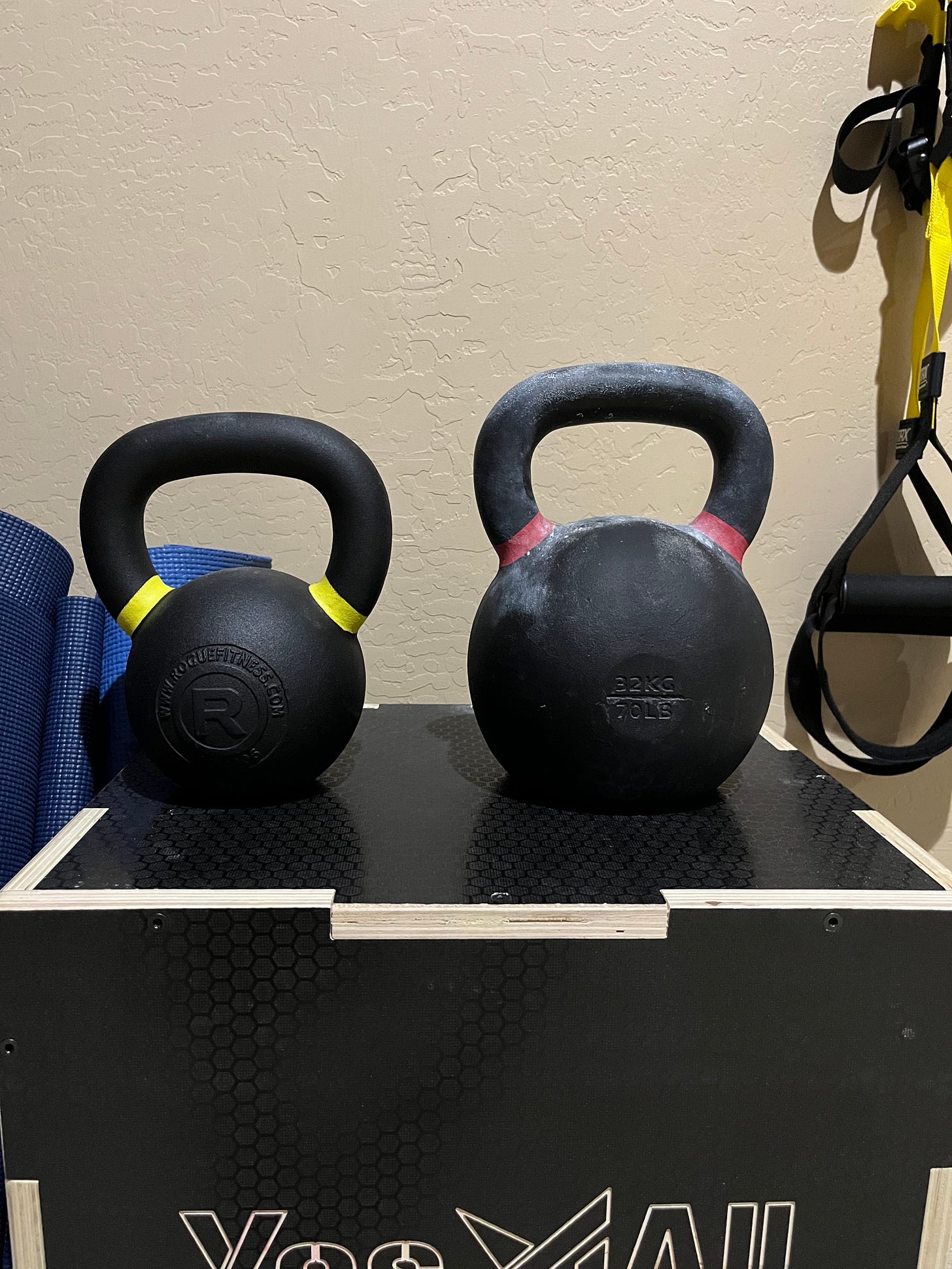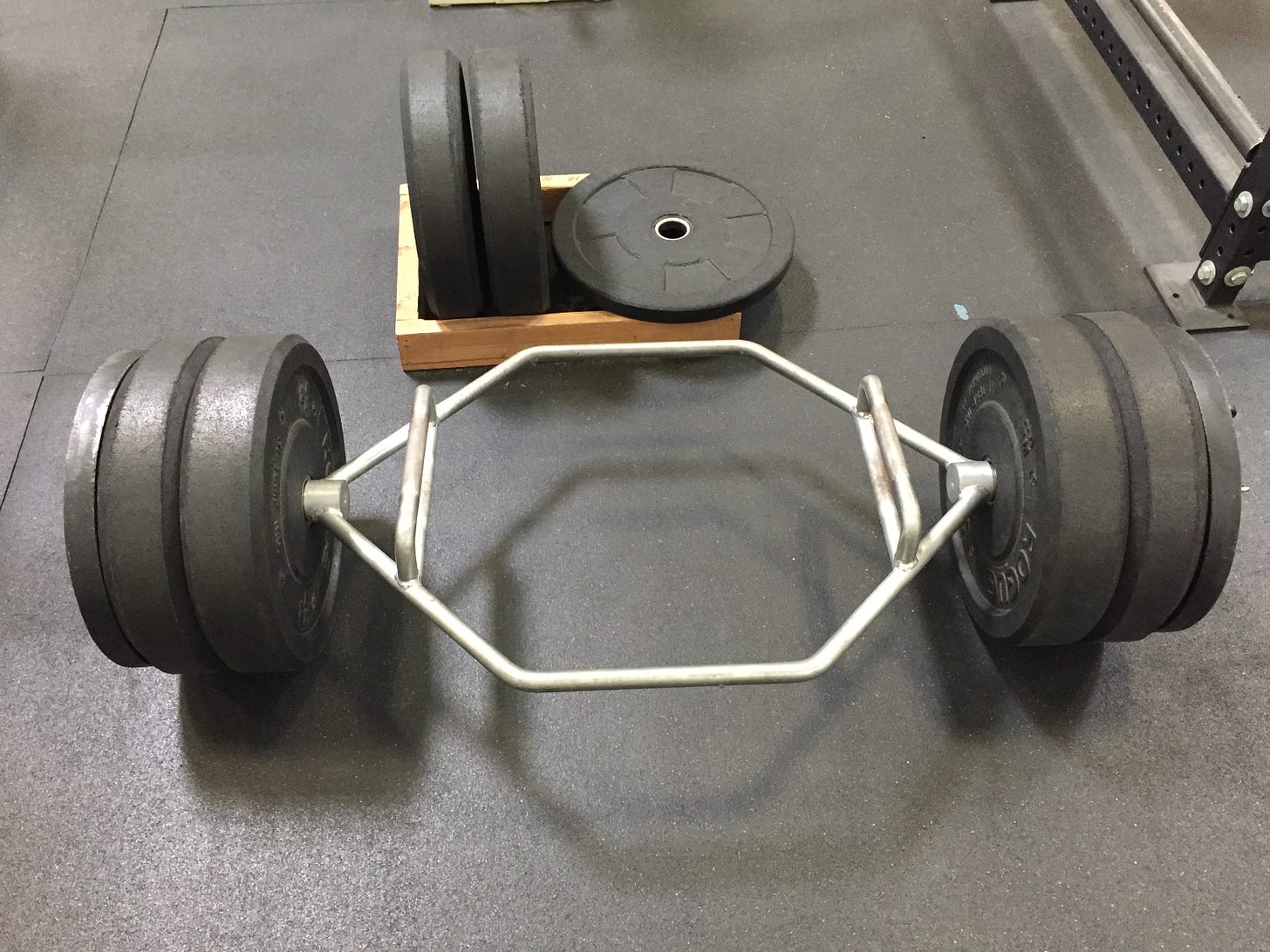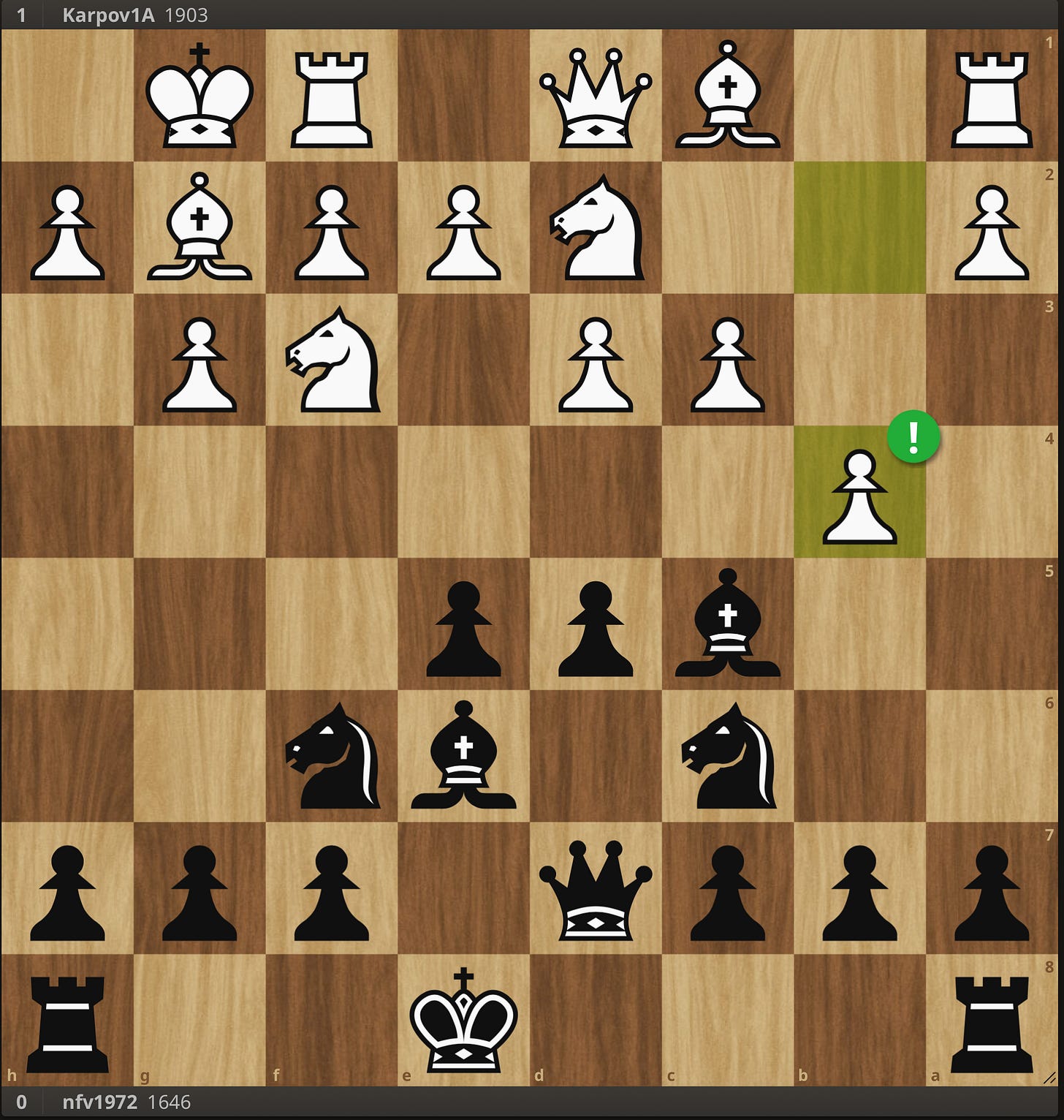Welcome back to Chess in Small Doses. I took a break from writing to visit Chicago with my family for Fall Break. It was wonderful, we loved the city. Now that we’re back, it’s time to resume writing. Let’s get started!
A Heavy Lift
During the pandemic I found two things that saved my sanity. The first was chess, something I had always wished I was better at. The second was kettlebells.
By January 2020, my wife and I had been going to our trainers gym for over 10 years. Long story short, it was important to us as healthcare professionals that we walk the walk. By March of 2020 the world shut down and so did our gym. Fast forward a few months and we had improvised a home gym, filling it in with weights and equipment later. Without the trainer, I struggled to find the motivation and found I really didn’t like the 1- 1 1/2 hours it took me to complete a work out. I needed a change. Enter the kettlebell.
I started to follow a Simple and Sinister training regimen. I loved it. I didn’t need external motivation, I found I wanted to train every day. My experience with this was similar to chess improvement though. I improved quickly, only to hit plateaus. I found curiously that the harder I worked, the worse I felt. There were so many lessons along that way.
In time I realized that progress in strength is really not about muscles but about your nervous system adapting to the work. Getting stronger requires your mind and body to change. In this way it is no different than improving at anything. I found some truths in common with both chess and strength training. They are:
Progress takes time
Heavy weight is instructive
Pain is not gain
Habits = Outcomes (“Repeat until strong”)
Ego is the enemy
Coaches can help
Allow me to explain although first a disclaimer. In no way am I trying to brag or claim some type of superiority. I’m just sharing what I’ve learned about improvement at anything.
#1) Progress takes time
Above is the picture of two kettlebells. The yellow one on the left is 35 lbs and then red one on the right is 70lbs. I started with the yellow one… and got hurt. I was trying to advance too fast and strained an oblique. I had to lay off for a few weeks and begin again, with lower volume. Later, after making some changes and allowing time to pass I was able to move up in weight and eventually got to the bell on the right.
What had happened was that after an initial few weeks of work, I thought I was ready to move on. I got bored and needed to feel progress. Thats when I got hurt. I didn’t appreciate how much time was needed to get stronger.
Above is my chess.com rating graph. I’ve since switched to Lichess but I began my journey with chess also in the pandemic. I went from the 1400’s into the 1600’s over 2 years. There was a lot of hard work there, but also a lot of time. I firmly believe that focused work over time is what makes progress. However, time is one of the essential elements and we all wish it took less time to see progress.
#2) Heavy weight is instructive
In the past I’ve worked on deadlifts like this one (300+lbs). Take the weight off down to one small plate, almost any movement will lift the weight. Put all these plates on, now only correct form will lift that weight. You learn correct form or the weight won’t budge. If you never try to lift something heavier, you never see if your form is correct.
Same for chess. In this game, I took on someone nearly 300 points higher rated than myself and lost… but learned my form was not correct.
I had played Bc5? before, allowing b4 to come with tempo, followed by b5 dislodging the knight. A rookie mistake, but no one had challenged me like this before. I had never faced this level of competition previously. I learned to watch out for the pawn breaks partly because of this game. Playing against much stronger players will show you where you need work.
#3) Pain is not gain
Time under tension is. Any weight will only be lifted by creating enough tension in your muscles to overcome the gravity of the weight. Whatever time you spend under tension is work. You do not need to push your muscles into fatigue or failure. In fact, this kind of work is often counter productive. Muscles grow stronger after a challenge is they’re allowed to rest and recover capacity. Large amounts of lactic acid can be counter productive to that, preventing muscle repair until the lactic acid is cleared.
The corollary for chess is burnout. More is not always better and in fact studying more and more will lead to fatigue and resentment of chess. Many people have mistakenly added more and more work onto their plate, only to then wonder why they’re not progressing. More study is not progress, but time under focus is. Focused work over time with adequate rest to recharge is the pathway to getting stronger at chess. In this case the key part is the focus. No focus, no growth. It just takes longer than we’d like.
#4) Habits = Outcomes
Getting stronger is remarkably simply, it’s us who makes it complicated. Find a routine that works for you and repeat until strong. The hard part is life can get complicated, especially for parents. We also get bored. We want new challenges, new experiences. But if you switch up frequently and seek out a new routine, all you’ll likely do is set yourself back to square one. It’s not WHAT you’re doing that matters for progress, rather it’s THAT you’re doing it.
Same for chess. You could have all the books you want on the shelf (like I do) and have had them for years but still have the same issue, I’m not getting stronger. It’s me who's made it harder. All I need to do is find a routine and then repeat it consistently. The consistent habit is hardest part and its what generates the outcomes we all seek.
#5) Ego is the Enemy
All of us have ego, but some more than others. We expect that given some work, we’ll make gains. That was certainly true for me. I started out well enough, but after a few weeks I thought I was ready to move up to higher volume of work, a greater challenge. I wasn’t. I felt a twinge one day during an exercise and had to stop. The pain got worse the next day and I had to knock off for nearly 3 weeks. It was ego that told me I needed to have results that quickly. It was ego that told me what I had gained was not good enough, that I needed to push it harder.
I don’t know about you but I find the same thing to be true for my chess. I went up nearly 200 points in 2 years and I have not had anything like that same progress since. There’s no guarantee that I’ll get better, but ego tells me that I should. It’s maddening when I don’t.
Ego is the enemy of progress. Rather than focusing on outcomes or achievements (wins are so satisfying) we need to focus on the process of improvement. Identify a routine and repeat until strong. For example - analyze each and every one of your games for common mistakes or patterns, then try to eliminate them one at a time. Yes that takes time… but that time will pass anyway.
#6) Coaches can help
After I got hurt, I knew I needed some help. I found a certified coach and we started working together. When we started I was lifting the 35lb bell. He made some changes and then we just kept at it. We started in March and by November of the same year I achieved my goal of doing the set routine but with a 70lb bell. It was a huge day for me emotionally but as far as the work felt, it was just another session. We had progressed beyond my target and I hadn’t even realized it.
Coaches in chess can do the same (if you find the right fit). They can shorten the time it takes to progress. A coach can give us a framework, a target to shoot for, but we have to put in the sweat. If you choose to engage a coach, make clear to them what your goal is. Make it specific and make it clear. Then just keep putting in the work.
Thanks for reading! Let me know what you think and leave a comment or share. Next time I’ll share with you my October Chess report. We’ll see how things are going.
P.S. One last lesson. Sometimes, you need a break. No one can train every day for ever. Your body will occasionally need breaks to recover. Same for your mind with chess. If you’re working hard but not seeing progress, maybe give it a break for a bit and come back fresh.











Good post! I took a small break from serious chess training before a tourney as I was getting mild "chess burnout". One can't grind everyday.
You're too kind!